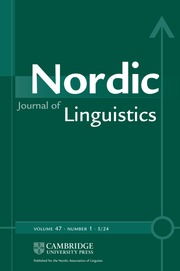The second issue of Volume 39 (autumn 2016) of the Nordic Journal of Linguistics will be a special issue devoted to discourse, grammar and intersubjectivity. This issue will be edited by Marja Etelämäki, Ilona Herlin, Tapani Möttönen and Laura Visapää.
During the past years, understanding of human language, mind and action has taken a radically social turn. In many fields of research, human mind, language and action are now studied as thoroughly social and intersubjective phenomena; simultaneously, human sociality and intersubjectivity per se have become topics for multi-disciplinary studies.
At present, studies concerning human intersubjectivity have at least three foci. One approach focusses on intersubjectivity as a property of human mind, drawing on research in philosophy, psychology, and cognitive and neuroscientific studies. The theory of enactivism is particularly prominent in this respect. Another focus is on language and intersubjectivity as cognitive phenomena. The third line of research has its roots in sociology, where intersubjectivity is understood as an achievement of organized social interaction. Within this approach, the focus is on intersubjectivity as situated in the social world rather than the human mind. Drawing on the methodology of conversation analysis, this approach is radically empirical, emphasizing the importance of recorded data from authentic interactions.
Regardless of a shared understanding of humans as thoroughly social beings, these three lines of research do not easily meet. Psychological and cognitive studies have, to a large extent, neglected the role of language in the constitution of human intersubjectivity; studies of language and intersubjectivity are either purely theoretical or focus on language as a means for sharing experience at the cognitive level, neglecting the affective and action-oriented level of human interaction; interactionally-oriented empirical studies on intersubjectivity mainly neglect – some even reject – the cognitive dimension of language and intersubjectivity. The result is that there is only a handful of empirical studies that approach grammar as a socio-cognitive, profoundly action- and affect-oriented phenomenon, and hardly any that use authentic interaction as data.
The proposed special issue aims at bridging the gap between these three lines of research, especially the cognitively- and interactionally-oriented studies on language and intersubjectivity. By proposing that language be studied as a socio-cognitive phenomenon that functions as an interface between social mind and social world, it brings language into the focus in the study of intersubjectivity. Further, it brings interaction and emotion into focus in the study on language.
We invite papers written in both the empirical and the philosophic-theoretical traditions, and we also welcome multidisciplinary approaches. We encourage the empirical papers to use especially Nordic languages as data. We wish to bring theory and empirical findings as well as differing approaches into a fruitful dialogue in order to better understand the role of discourse and grammar in the constitution of intersubjectivity.
Submissions for papers should follow the style guide of NJL available at http://journals.cambridge.org/NJL.
The deadline for submitted papers is 2 November 2015. Papers should be sent to either of the following two guest editors:

The reviewing process will take place in winter–spring 2015–2016. The final version of all accepted manuscripts will be submitted to the publisher by 1 July 2016.

